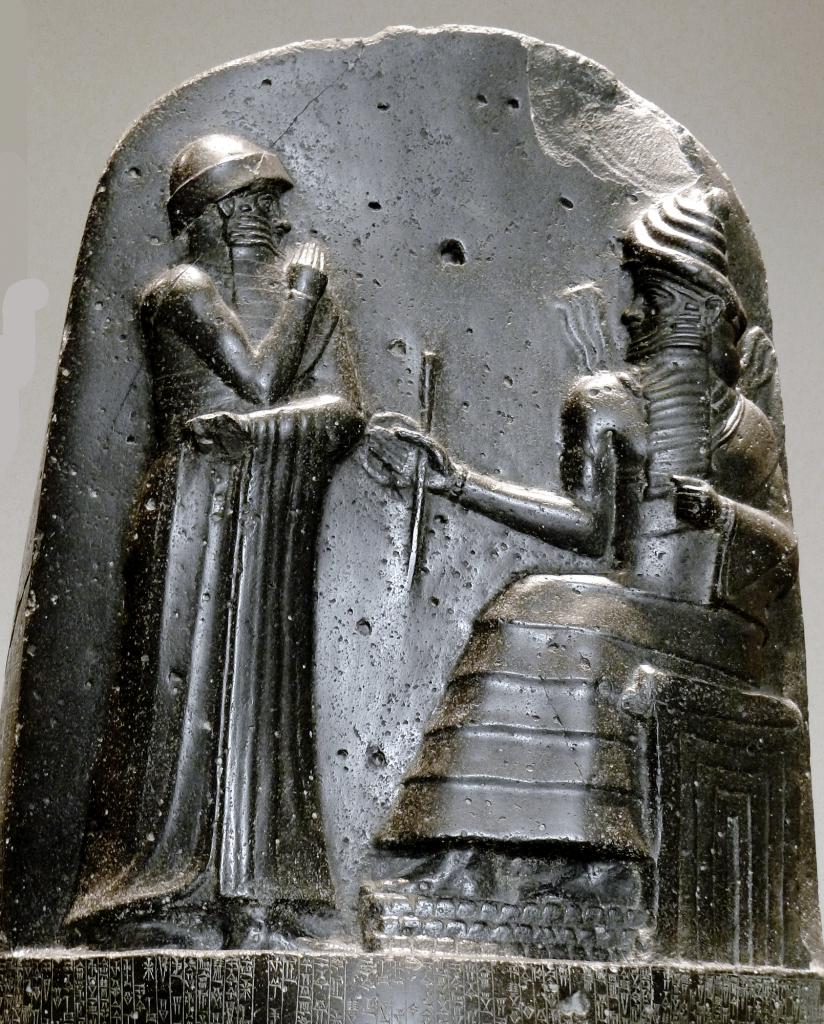Conventionally, people contrast “honor and shame” with “law.” We need to reflect more on their inter-relationship. I’ve previously illustrated the relationship of these two metaphors. Now I want to turn attention to the way “honor and shame” (H&S) influence ancient laws. Then we can consider how the Mosaic Law challenges or reshapes prevailing views about H&S.

Status in the Laws of Hammurabi
Ancient law codes did not function the way modern laws work. They typically were not widely published for all to read. Instead, a select group of judges and royal officials used or recorded such “laws” much like “case law” is today. Specific examples of situations gave insight as to how to handle other similar instances.
The Code of Hammurabi is perhaps the best-known example of an ancient law code (outside the Bible). Hammurabi was a Babylonian king who ruled approximately from 1792 to 1750 B.C.
These laws explicitly dictated consequences for offenses based on social rank.
200. If a man knocks out the teeth of his equal, his teeth shall be knocked out.
201. If anyone strikes the body of a man higher in rank than he, he shall receive sixty blows with an ox-whip in public.
202. If a free-born man strikes the body of another free-born man or equal rank, he shall pay one gold mina.
203. If the slave of a freed man strikes the body of a freed man, his ear shall be cut off.
Law #200 will look familiar (lex talionis, A tooth for a tooth), but it only applies to social equals. Penalties were assessed based on the social rank of the offender and the offended. Just imagine what might happen to foreigners (who have no status in society) if they committed some offense!
The law itself favored those honored in society while lower status persons were subject to greater degrees of shaming. In other words, I’m not describing unjust application of the law; rather, the law itself encoded or reinforced honor-shame codes.

Biblical Honor-Shame Codes
The principle of lex talionis [“eye for eye, tooth for tooth”] is deeply etched on what remains of the Western conscience. Because people do not know the honor-shame dynamics of the ancient world, a problem hangs over how most people understand this biblical principle.
The Bible affirms lex talionis in a few places (Exod 21:20–25; Lev 24:19–22; Deut 19:18–21; Gen 9:6). As with all Scripture, context is king. Lev 24:17–22 offers clarifying rationale.
Whoever takes a human life shall surely be put to death. 18 Whoever takes an animal’s life shall make it good, life for life. 19 If anyone injures his neighbor, as he has done it shall be done to him, 20 fracture for fracture, eye for eye, tooth for tooth; whatever injury he has given a person shall be given to him. 21 Whoever kills an animal shall make it good, and whoever kills a person shall be put to death. 22 You shall have the same rule for the sojourner and for the native, for I am the Lord your God.
Whereas other ancient codes dictated punishments based on social rank, the Mosaic Law espoused equality, even for foreigners.
Christopher D. Marshall offers a good summary:
It is crucial to understand that, contrary to popular perception, the lex talionis was never intended to sanction revenge. Revenge is expressly forbidden in biblical law (Lev. 19:18; Deut. 32:35; cf. Prov. 20:22; 24:29). Instead, the lex served the twofold purpose of limiting the destructive effects of retribution on the one hand, especially in blood feuds between clans and families, and providing an equitable basis for making restitution or reparation in personal injury cases on the other. Far from encouraging aging revenge, the lex limited retaliation to the appropriate measure of the offense, so that excessive reprisal was ruled out. The “eye for an eye” was a law of proportion: only an eye for an eye and no more. (Beyond Retribution, p. 80)
The Law Defends Human Honor
In the Bible, lex talionis [“eye for eye, tooth for tooth”] treats the lowly with honor; it expresses mercy. When an outsider and low-status person commits wrong, he ought not suffer the shame of unjust punishments that the social elites avoid. Thus Krause states, “The lex talionis is a way to restrain the action of anger” (Jesus Christ our Lord, 225).
God repeatedly emphasizes his desire in the Pentateuch. Here are just a couple of examples:
There shall be one law for the native and for the stranger who sojourns among you. (Exod 12:49)
When a stranger sojourns with you in your land, you shall not do him wrong. 34 You shall treat the stranger who sojourns with you as the native among you, and you shall love him as yourself, for you were strangers in the land of Egypt: I am the LORD your God. 35 “You shall do no wrong in judgment, in measures of length or weight or quantity. 36 You shall have just balances, just weights, a just ephah, and a just hin: I am the LORD your God, who brought you out of the land of Egypt.” (Lev 19:33–36)
Also, cf. Deut 10:16–19; Numb 9:14; 15:15–16
Accordingly, Michael Coogan explains the purpose of this principle was “to prevent people from taking the law into their own hands and exacting disproportionate vengeance for offenses committed against them” (A Brief Introduction to the Old Testament, p. 112).
Laws are not Sacred. Honor Is.
How might these observations affect the relationship between law, honor, and shame? Here are a few important observations.
1. Legal metaphors are not inherently sacred. “Law” is just one metaphor among others. Laws can be just or unjust.
2. Laws encode social ideas about honor and shame.
3. Understanding how honor and shame function in societies is important both for interpreting the Bible and applying it in our day.
4. The Mosaic Law demonstrates how God protects the honor his image-bearers, but not based on social convention.
What other implications do you draw from these observations?












